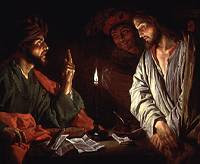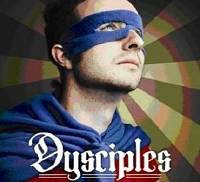In John 18 we read of Yahshua's arrest in the olive grove, how he is taken first to Annas, then to Caiaphas, and finally to Pilate.
 During the night, waiting to find out what will happen to him, Peter denies three times that he knows him or was with him. Another follower is braver (verses 15-16), was this Nicodemus? We don't know but it seems quite likely. Pilate interviews the prisoner, quickly finds him innocent, and tries to get him released.
During the night, waiting to find out what will happen to him, Peter denies three times that he knows him or was with him. Another follower is braver (verses 15-16), was this Nicodemus? We don't know but it seems quite likely. Pilate interviews the prisoner, quickly finds him innocent, and tries to get him released.Pilate treats his unwanted prisoner much better than the Jewish authorities do. They don't seem to care whether he is innocent or guilty, they have already decided he must die because he claimed to be the Son of the Most High and also because he uttered the Holy Name, Yahweh, I AM. They are offended because they do not believe him. According to Jewish law, the High Priest would speak the Name once a year inside the Holy of Holies. If they had understood that Yahshua was indeed the Highest of High Priests, and the Son, and the Messiah, and the sacrificial Lamb, they would not have sentenced him to death. But as the Lamb, it was necessary that he die for the sins of the world.
They didn't understand who he was although they had all the evidence they needed, so according to them he was guilty of blasphemy and should be stoned to death. However the Roman authorities had banned the death penalty under Jewish Law, so only the Romans were permitted to kill a prisoner. That's why the Jews involved Pontius Pilate.
But Pilate proved to be a fair man. He told the Jews to try him under their own law which would have carried a lesser penalty than death because of the Roman prohibition. But they'd have none of it. So Pilate interrogated Yahshua. Pilate asks, 'What is truth?' As a Roman provincial governor, 'truth' was whatever he chose to make it. If Pilate said so, it was so! So he went back to the Jewish crowd, pronounced Yahshua not guilty, and offered to release him according to the Jewish Passover custom. But they preferred the rebel, Bar Abbas, and called for his release!
Let's look at the conversations with Pilate in more detail. First, he asks the Jews what charges they are bringing. Instead of giving a straight answer they say that if he was innocent they wouldn't have handed him over. That was no more than an evasive non-answer.
Next Pilate tells them to apply Jewish law but they complain they can't apply the death penalty.
Pilate then decided to have a conversation with the prisoner himself, 'Are you the King of the Jews?'
Yahshua asks him if this is his own idea or whether the Jews have suggested it. And Pilate replies, 'Am I a Jew?' which effectively means, 'Of course they told me. How would I know?' He wants to find out what this man has done to so upset his own people. Yahshua replies that his Kingdom is not of this world but from another place. To a Roman, 'this world' would mean the Graeco-Roman world. Was the man saying he was from India, or Parthia, or somewhere else outside the Empire?
So far, Pilate might have been anxious only about the political issues and the danger of crowd trouble. But as we'll see in chapter 19, this is about to change.
His attitude up to this point seems entirely reasonable. The man is not guilty and should be released, so Pilate does his level best to do just that. However, the Jewish leadership and the crowds are combining to make this difficult to accomplish, and in the end the death of one man must have seemed less important to Pilate than the many deaths that would result from a riot in Jerusalem. Furthermore, King Herod and Caesar himself would regard civil unrest at a major religious festival as failure and he would not be prepared to push things so far as to provoke that. From Pilate's perspective preventing unrest was essential, saving this man's life was not.
But Pilate was not the only man in Jerusalem wanting to avoid trouble. By the time Yahshua and Pilate were in conversation Peter was feeling a very wretched failure. He had denied even knowing the Master. Peter was afraid of losing his own life and spoke out of that fear. Sometimes we speak out of fear too, it can freeze us into inaction or denial on the one hand, or send us into full-blown and headlong flight on the other.
What is the antidote to fear? Love. Perfect love casts out fear (1 John 4:18). Later, the risen Lord would ask Peter, 'Do you love me?', as we shall see in chapter 21.
< John 17 | Index | John 19 >






